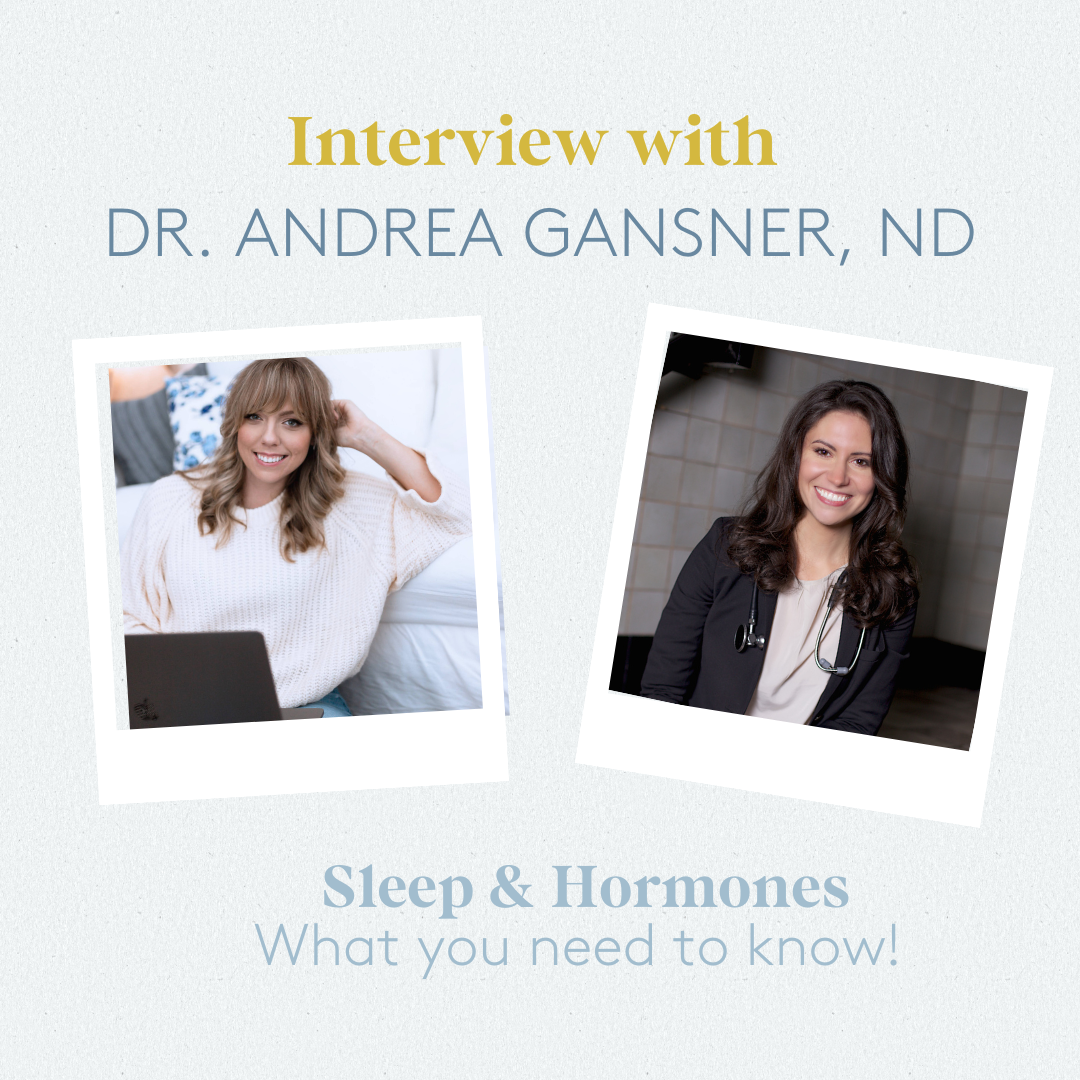Why Understanding Your Hormones is important for Sleep.
Dr. Andrea Gansner came into my life at the most perfect time. I was struggling with adult acne, unexplained weight gain, mood swings and so much more. I tried traditional medicine approach but new I needed specialized support if I was to understand the cause of what was going on. She is kind, supportive and one of the most knowledgeable people I know and I am so lucky to have her as part of health team! I brought her on to the blog to share her wealth of knowledge in the hopes that it could help someone else who is struggling to find some guidance! Here we go!
Good morning Dr. Andrea! I thought we would lead off with a little introduction! Can you tell us a little about your background? What got you into naturopathic medicine?
I grew up in a small town in northern BC and from a young age, had both my family doctor and naturopathic doctor oversee my health care. It was a very supportive and inclusive approach that I assumed many people experienced. As a young adult going to UBC, I realized that the integrative approach I had experienced was not the norm. I wanted to help change this, so after my undergraduate degree, I went to naturopathic medical school and now work alongside a number of health care providers to integrate care for our patients. I truly love what I do; I get to work alongside my patients to help them feel their best.
What is your speciality?
I practice functional naturopathic medicine with a focus in digestion, hormonal health conditions (PCOS, fertility, menopause, pregnancy, thyroid disorders), weight loss, and skin care.
That is so fantastic and I am sure many women have difficulty finding the right supports! I know through our work together, we have gone through a lot of hormone support and through our data collection I learned that my hormones play a major role in sleep quality/quantity. Can you share with our readers what kind of hormone imbalances may relate to sleep?
Sure of course! Well to start with, the body goes through changes in hormones daily, monthly, and throughout the life cycle. Some hormone changes are a normal part of life for people with uteruses, such as throughout the menstrual cycle or during pregnancy.
For example, progesterone drops just before a period starts, leading to issues falling and staying asleep. As progesterone rises through the cycle, getting to sleep becomes easier.
Further, high estrogen levels in early pregnancy can lead to sleep problems.
Other hormone changes, however, may signal underlying problems. Cortisol, the stress hormone, is critical when it comes to sleep and functioning. Dopamine, the reward or “feel good” hormone, can also affect the ability to fall and stay asleep. Melatonin is naturally produced in the body to facilitate sleep, but may itself be impacted by behaviours or other hormones.
What are some symptoms that may occur that signal hormone imbalance?
The menstrual cycle tells a lot about a person’s health, and can be one of the first indicators that there is an imbalance in the body. It is important to take note of the regularity and heaviness of your cycle.
Ask yourself the following questions: Have there been recent changes? Have your periods been heavier than normal? Are your cycles regular, or do they vary month to month?
Acne is another indicator of hormonal imbalance, especially if you have an acne “beard”, which are cysts and pimples across the jaw and chin, or across the cheek and back.
Other symptoms of hormonal imbalance include hair loss, hirsutism (excessive hair growth on the body), sudden weight changes, and mood changes.
Now I have experienced this, and it also has come up a lot with my clients. What about Restless Legs? How do hormone imbalances relate to this syndrome?
Restless legs syndrome is almost twice as common in people with uteruses compared to those without. While not conclusive, the research suggests that fluctuations in hormones may impact the development of Restless Legs Syndrome. As this condition often appears for the first time during pregnancy, during which the body is going through drastic shifts in hormones, the role of hormones may be central to the development of the condition.
Additional causes of restless legs syndrome may include dopamine and thyroid hormone imbalances.
If we had to give the readers some behaviour changes they could make today what would be your top 3 suggestions to support hormone balancing?
1. Maintain proper sleep hygiene. Check out YBG’s free sleep hygiene quiz and PDF for valuable tips!
2. Move your body in ways that make you feel good everyday. Aim for around 30 minutes of exercise daily
3. Eat a balanced diet with whole foods, lean protein and limit alcohol, caffeine, and sugar. Check out a previous blog post we did on best foods for sleep!
xoxo, Nicole
This article does not constitute medical advice. Consult your naturopathic doctor or medical practitioner before taking any supplement or medication.
